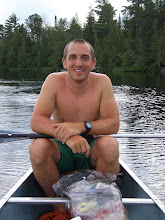


Last night, Joy and I went to Chicago’s 1st Annual
Pizza Fest. This is our second 1st Annual event in Chicago this year (
Looptopia!), and the reason we wanted to go to Pizza Fest had nothing to do with the pizza. You see,
Over the Rhine was playing at the event, and Over the Rhine just happens to be my favorite band (Joy and I even met them after the show!) I’ve seen them play a few other times and it’s never disappointing. While they’re not a Christian band, that doesn’t mean they avoid theology, and they are fine theologians. So fine, in fact, that their songs usually enhance my worship exponentially more than the music in most of the church services I attend. One of the songs they sang last night has been a favorite of mine since it came out on their disc “Ohio” a few years ago. The song is called “Long Lost Brother” and here are the lyrics:
“I thought that we'd be
Further along by now
I can't remember how
We stumbled to this place
I loved you like a long lost brother
On a bad day maybe I thought why bother
I've seldom seen so much anger
In a face
I wanna do better
I wanna try harder
I wanna believe
Down to the letter
Jesus and Mary,
Can you carry us
Across this ocean
Into the arms of forgiveness?
I don't mean to laugh out loud
I'm trying to come clean
Trying to shed my doubt
Maybe I should just keep
My big mouth shut
More often than not
When it comes to you
You want whatever's not in front of you
Deep down I know this includes me too
So tell me your troubles
Let your pain rain down
I know my job I've been around
I invest in the mess
I'm a low cost dumping ground
Trouble is I'm so exhausted
The plot, you see, I think I've lost it
I need the grace to find what can't be found”
There are several lines that sink into my depths and long to be acknowledged. Don’t we all have bad days where we think why bother? Don’t we all want whatever’s not in front of us? Don’t we all need the grace to find what can’t be found? I know I do.
And then there’s the chorus crying out for forgiveness. “Jesus and Mary, can you carry us across the ocean into the arms of forgiveness?” Doesn’t it so often seem that forgiveness requires getting over an ocean, an ocean we can’t possibly cross on our own? An ocean that requires us to relinquish control, relinquish hatred, relinquish pride, relinquish self, and
be carried.
I can remember when I was a child, and I would try to stay up late watching TV with my parents. I’d drift in and out of consciousness, but I would usually hear my parents turn off the TV and begin to get ready to go upstairs. I wouldn’t move. I’d lay on the floor or the couch, hoping to convince my parents that I was more out of consciousness than in. If my plan worked, my dad would swoop me up in his arms and carry me directly to my bed. I loved those moments, the tremendous love I felt as I was delicately picked up with my head against my father’s chest, my arms and legs falling off into varied directions. Then my dad would move up the stairs, down the hallway, and put me softly into my bed. It is a wonderful thing to be carried, filled with vulnerability and tenderness. It’s this tenderness and vulnerability that I think best allows us to receive both grace and forgiveness.








